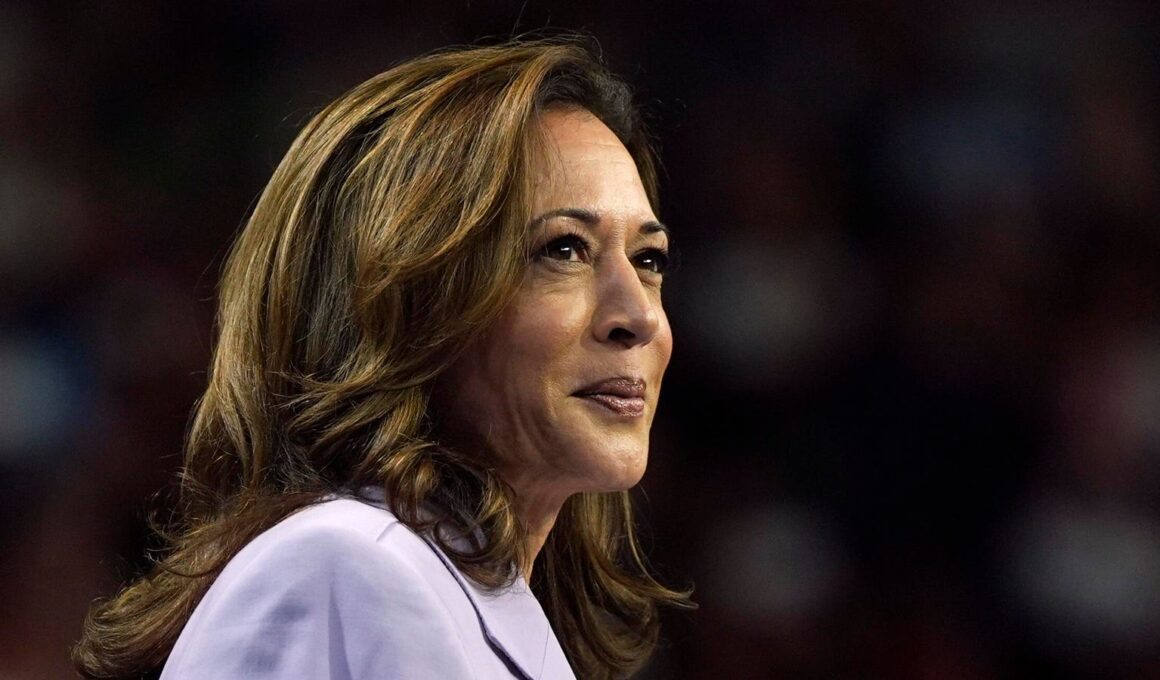Topline
Vice President Kamala Harris is expected to unveil more details about her economic agenda during a Friday speech in North Carolina, in which early reports and campaign statements about her policies suggest the Democratic nominee will focus on lowering grocery prices, addressing housing costs and more, with an eye on bolstering the middle class.
Vice President Kamala Harris speaks at a campaign rally on Aug. 10 in Las Vegas.
Key Facts
Grocery Prices: The Harris campaign said Wednesday the candidate would work in her first 100 days to help Congress pass a national ban on “price gouging” for food and groceries, as well as give the Federal Trade Commission and prosecutors authority to go after companies they determine price gouge, support small businesses in the industry, take a closer look at mergers between big grocery companies and “aggressively” investigate price-fixing in meat supply chains specifically.
Housing Costs: Harris will also announce measures Friday addressing housing costs, her campaign said, and The Guardian reports she will support plans to fund more affordable housing and build communities that are more resistant to the impacts of climate change.
Taxes: Harris will continue President Joe Biden’s promise not to raise taxes on American households earning $400,000 or less annually, but does support raising taxes for high earners and corporations, according to The New York Times.
No Tax On Tips: Harris endorsed a plan to get rid of taxes on tips for hospitality and service workers, echoing a proposal by former President Donald Trump—which has been criticized by some experts—though a campaign official told CNN tips would still be subject to payroll taxes, and would include an income limit and guardrails to prevent people like hedge fund managers from taking advantage of the policy.
Child Tax Credit: Harris wants to expand the child tax credit, Politico reports, and reportedly chose Minnesota Gov. Tim Walz in part because of his success implementing that and paid leave in his state.
Paid Leave: Harris has not released a specific paid leave proposal, but she has previously co-sponsored 12-week paid leave legislation, Politico notes, with Sen. Patty Murray, D-Wash., telling the outlet, “I absolutely believe that when they are in office, we will get a paid leave bill done finally.”
Prescription Drug Prices: The Harris campaign said Wednesday that Harris’ Friday speech will include policies regarding prescription drug costs, after the Biden administration announced Thursday it reached a deal to lower Medicare costs for 10 widely used prescription drugs.
Minimum Wage: Harris called for raising the minimum wage in a Las Vegas speech earlier in August, but her campaign has not specified how high she believes it should be raised.
Fed Independence: Harris has vowed to maintain the Federal Reserve’s independence after Trump said he believed “the president should have at least [a] say” on the Federal Reserve’s decisions, with Harris telling reporters, “The Fed is an independent entity and as president I would never interfere in the decisions that the Fed makes.”
Get Forbes Breaking News Text Alerts: We’re launching text message alerts so you’ll always know the biggest stories shaping the day’s headlines. Text “Alerts” to (201) 335-0739 or sign up here.
How Do Harris’ Policies Compare With Biden’s?
Harris’ economic policy agenda is expected to be largely in line with Biden’s economic platform, though she’s likely to emphasize different policies than the president did, like paid leave. “Same values, different vision,” a Harris aide told The Guardian. “She’s not moving far away from him on substance, she will highlight the ones that matter most to her.” The initial plans from Harris’ campaign on “price gouging” suggest the vice president plans to be more aggressive in her policy approaches than Biden, however, as polls have suggested voters hold dim views of how the president has handled the economy. While Biden has also opposed price gouging, Harris’ proposal to enable the FTC and U.S. attorneys to go after companies that hike up prices goes beyond what the president has proposed, Politico notes.
Contra
While Harris will give more detail about her economic proposals Friday, her speech is expected to be fairly light on specific details, which The New York Times reports is by design. The Times reports the Harris campaign has adopted a “strategic vagueness” for her economic proposals, believing that being more of a “blank slate” will help ward off attacks and attract more support from business groups.
How Do Harris’ Policies Compare With Trump’s?
Trump’s economic agenda is largely focused on raising tariffs on imported goods, which Harris has said she opposes. The ex-president has also called for cutting taxes and regulations in hopes of lowering inflation, including lowering the corporate tax rate, and has encouraged increasing oil production in order to lower energy prices. In addition to his “no tax on tips” proposal that Harris has also endorsed, Trump has called for ending taxes on Social Security benefits, which Harris has not yet responded to. Experts believe the ex-president’s proposal could speed up Social Security and Medicare becoming insolvent, with the Committee for a Responsible Federal Budget projecting exempting taxes on benefits would result in Social Security and Medicare receiving $1.6 trillion less in revenue between 2026 and 2035. The Trump campaign opposed reports of Harris’ economic proposals Wednesday, with spokesperson Steven Cheung saying in a statement, “Kamala Harris can’t hide from her disastrous record of skyrocketing inflation … Americans are struggling under the Biden-Harris economy, and now she wants to gaslight them into believing her bald-faced lies.”
Big Number
42%. That’s the share of voters who trust Harris more to handle the economy, according to a Financial Times/University of Michigan poll released Sunday, versus 41% who trust Trump more. That’s down from Trump holding a six-point lead over Biden in July, though the poll also showed 42% believe a Trump presidency would leave them better off financially, while only 33% said the same for Harris.
Key Background
Harris became the presumptive Democratic presidential nominee in July after Biden stepped down suddenly from the presidential race, following weeks of pressure over mounting concerns about his mental fitness. While the vice president has quickly garnered Democrats’ support and risen in the polls, Harris has released few concrete policy proposals in the first few weeks of her campaign—drawing some criticism as a result—with her speech Friday expected to be the most substantive remarks she’s given on policy so far. Her focus on the economy comes as polling has repeatedly shown it’s the most important issue to voters in this election cycle, with the vice president hoping to attract support amid low approval ratings for Biden’s handling of the economy. Harris’ speech also comes days after news that inflation fell in July to its lowest point in more than three years, with federal data released Wednesday showing inflation at 2.9% in July, the first time it’s been below 3% since March 2021.
Further Reading









